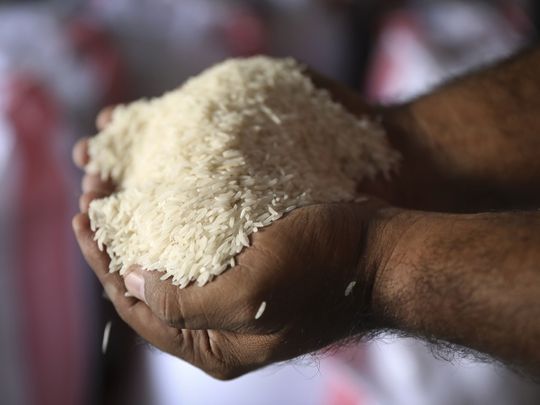
Dubai: Food retailers and grain traders in the UAE have been able to easily compensate for the drop in rice exports from India, after a ban came into effect on September 9.
Making it easy for retailers - and consumers - was the fact that India ban extended only to one specific category of rice - the ‘broken’ variety. “There were a few days just before the ban came into effect when we were concerned about how to replace the broken rice imports from India,” said one of the biggest retail groups in the UAE. “While still, a niche compared to basmati rice, the broken version represented steady sales for us.”
India decided to impose the curbs to secure its domestic food essential storage and supplies. Earlier this year, the country had placed a similar curb on wheat exports after the Russia-Ukraine conflict started, which immediately led to a spike in global wheat prices and supplies. The UAE was one of the markets exempted from India’s decision on wheat.
With rice, other rice-growing markets have managed to make up for the shortfall from India, according to Dr Dhananjay Datar, Chairman and Managing Director at Dubai-based Al Adil Group, a retailer and one of the biggest importers of foodstuffs from India.
But there’s still one issue that retailers/traders have to deal with. “India also imposed a 20 per cent duty on exports of various grades of rice, but, thankfully, excluded parboiled and basmati rice,” said Datar. “These two remain the most popular rice varieties in the UAE.

But because of the new duty on other varieties, those purchases will shift to Thailand, Indonesia, Pakistan as well as Vietnam.
Bonanza for other suppliers
Rice and food commodity importers have already been spreading their sourcing arrangements, as food prices escalated from a combination of supply issues, poor crops, and then the Ukraine situation. The re-opening of wheat and other commodity supplies from Ukraine’s ports did manage to bring prices down in recent weeks, but traders say it’s still a balancing act.
“Shipping costs are the other big factor, which is why India’s restrictions could further raise those costs,” said a trader. “We will need to try and source from as close a producer market as possible.”
Pakistan and Myanmar
Harish Tahiliani, Managing Director of Ajman-based Arab India Spices, concurs. “There are many sources/origins for rice varieties - for the UAE the major alternatives would be Pakistan or Myanmar. The exports from India are still open for basmati grades and the parboiled grades, and that’s still a huge plus.”
On the pricing side, there has not been much of a changing post-September 9 for rice at the retail level. According to one hypermarket operator.

There’s substantial stock already here or coming of basmati, and for a majority of UAE consumers, that’s just fine.
Ban and 20% duty
If broken rice has been hit with an export ban, India has imposed 20 per cent duty on shipments of unmilled white rice, semi-milled and wholly milled rice and husked brown rice. The government is maintaining extreme levels of caution on grain availability at a time when inflation in consumer prices is rising significantly.
This was also the rationale behind the earlier ban on wheat exports (UAE and some other countries were exempted) after the start of the Russia-Ukraine conflict.












